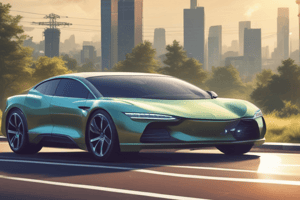Podcast
Questions and Answers
How do electric vehicles differ from internal combustion engine vehicles?
How do electric vehicles differ from internal combustion engine vehicles?
- They are noisier (correct)
- They have lower maintenance costs
- They have higher exhaust emissions
- They use gasoline as fuel
What is a cost advantage of owning an electric vehicle in developed countries?
What is a cost advantage of owning an electric vehicle in developed countries?
- Higher fueling costs
- Lower maintenance and fueling costs (correct)
- No cost advantage
- Higher maintenance costs
What is the primary source of energy for electric cars?
What is the primary source of energy for electric cars?
- Electricity (correct)
- Solar power
- Hydrogen fuel cells
- Gasoline
How are electric automobiles typically charged?
How are electric automobiles typically charged?
What is a common policy approach to promote the use of electric vehicles?
What is a common policy approach to promote the use of electric vehicles?
Flashcards
Electric vs. Gas Cars
Electric vs. Gas Cars
Electric cars use electricity to run, while traditional cars use gasoline.
Electric Cars: Lower Costs
Electric Cars: Lower Costs
Electric cars don't need oil changes or expensive engine repairs, making them cheaper to maintain.
Electric Car Charging
Electric Car Charging
Electric cars use a network of charging stations to replenish their batteries.
Electric Car Policy
Electric Car Policy
Signup and view all the flashcards
Electric Car Energy Source
Electric Car Energy Source
Signup and view all the flashcards
Study Notes
Electric Vehicles vs. Internal Combustion Engine Vehicles
- Electric vehicles (EVs) differ from internal combustion engine vehicles in their power source, with EVs running on electric motors and batteries, whereas internal combustion engine vehicles run on gasoline or diesel.
Cost Advantage
- Owning an electric vehicle in developed countries can be cost-effective due to lower operating costs, as electricity is generally cheaper than gasoline or diesel fuel.
Primary Source of Energy
- The primary source of energy for electric cars is the electrical grid, which can be powered by various energy sources such as coal, natural gas, nuclear, hydro, wind, or solar power.
Charging Electric Automobiles
- Electric automobiles are typically charged through a wall socket or dedicated charging station, using a charging cable connected to the vehicle.
Promoting Electric Vehicles
- A common policy approach to promote the use of electric vehicles is to offer incentives such as tax credits, rebates, or exemptions from certain fees, as well as investing in charging infrastructure.
Studying That Suits You
Use AI to generate personalized quizzes and flashcards to suit your learning preferences.




